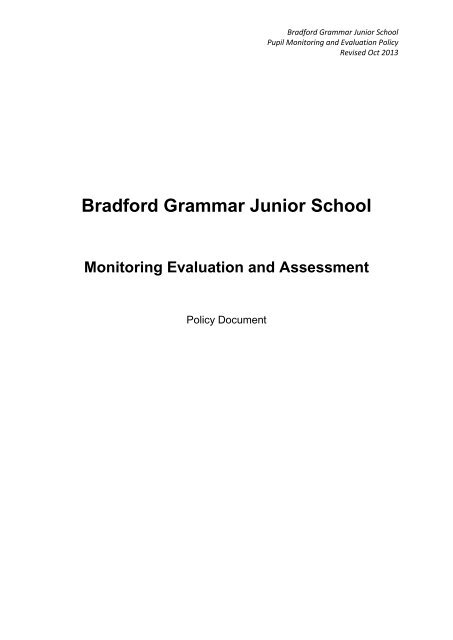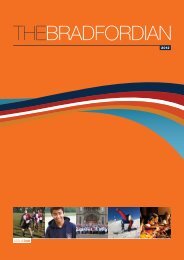Monitoring Evaluation and Assessment Policy - Bradford Grammar ...
Monitoring Evaluation and Assessment Policy - Bradford Grammar ...
Monitoring Evaluation and Assessment Policy - Bradford Grammar ...
Create successful ePaper yourself
Turn your PDF publications into a flip-book with our unique Google optimized e-Paper software.
<strong>Bradford</strong> <strong>Grammar</strong> Junior School<br />
Pupil <strong>Monitoring</strong> <strong>and</strong> <strong>Evaluation</strong> <strong>Policy</strong><br />
Revised Oct 2013<br />
<strong>Bradford</strong> <strong>Grammar</strong> Junior School<br />
<strong>Monitoring</strong> <strong>Evaluation</strong> <strong>and</strong> <strong>Assessment</strong><br />
<strong>Policy</strong> Document
POLICY FOR MONITORING AND EVALUATION<br />
<strong>Bradford</strong> <strong>Grammar</strong> Junior School<br />
Pupil <strong>Monitoring</strong> <strong>and</strong> <strong>Evaluation</strong> <strong>Policy</strong><br />
Revised Oct 2013<br />
Revised: for Sept 2011<br />
At <strong>Bradford</strong> <strong>Grammar</strong> Junior School we plan teaching <strong>and</strong> learning with a view to<br />
enabling each child to seek the highest level of personal achievement. To ensure<br />
that this happens monitoring takes place at several levels, to give us useful<br />
information about how well we are achieving our aims. <strong>Monitoring</strong> leads to evaluation<br />
<strong>and</strong> planned action so that we can continually improve <strong>and</strong> develop as a school.<br />
Each year the staff considers how <strong>Bradford</strong> <strong>Grammar</strong> Junior School is currently<br />
performing in each class <strong>and</strong> goes on to consider each pupil. From this we prioritise<br />
those areas which are to become targets. <strong>Assessment</strong> of pupils’ work should be both<br />
formative <strong>and</strong> summative <strong>and</strong> through this assessment of our own information <strong>and</strong><br />
from externally assessed information (CAT <strong>and</strong> NFER) pupils are discussed <strong>and</strong><br />
then appropriate help <strong>and</strong> support is administered (see tracking of pupils below).<br />
Each year in October all pupils who enter the school (from Year 4) are Cognitive<br />
Ability Tested (CAT) <strong>and</strong> this provides a baseline st<strong>and</strong>ardised score against which<br />
the yearly NFER (GL <strong>Assessment</strong>s) tests can be checked. The NFER results are<br />
then linked to the teachers’ performance management (Annual Review) targets <strong>and</strong><br />
each year information, about each pupil, is given to the teachers particularly relating<br />
to gifted <strong>and</strong> weaker pupils. The Head <strong>and</strong> Deputy Head are responsible for<br />
scrutinising the st<strong>and</strong>ardised information <strong>and</strong>, with the teachers, indicate which<br />
pupils require highlighting. This is then discussed at staff meetings <strong>and</strong> the individual<br />
performance management meetings.<br />
All pupils will take the NFER (GL <strong>Assessment</strong>) st<strong>and</strong>ardised tests after the internal<br />
exams in the summer term. The results of these, the internal exams <strong>and</strong> all the other<br />
information below will be shared with every teacher <strong>and</strong> each pupil discussed <strong>and</strong><br />
tracked as to their recent <strong>and</strong> past performance.
<strong>Bradford</strong> <strong>Grammar</strong> Junior School<br />
Pupil <strong>Monitoring</strong> <strong>and</strong> <strong>Evaluation</strong> <strong>Policy</strong><br />
Revised Oct 2013<br />
To help us monitor the curriculum <strong>and</strong> track our pupils we use information from:<br />
Our own internal assessments<br />
Examination (Internal) <strong>and</strong> Test results (external NFER <strong>and</strong> CAT etc.)<br />
Class observation<br />
Regular marking of children’s work<br />
The scrutiny of pupils’ work<br />
Attendance<br />
Admissions<br />
Behaviour <strong>and</strong> Attitudes<br />
Staff Performance Management.<br />
Specific assessment through special needs co-ordinator using LASS learning<br />
profile <strong>and</strong> DST (Dyslexia Screening Test) for learning difficulties.<br />
Pastorals meetings are held towards the end of the first half term, in autumn, where<br />
each child is considered <strong>and</strong> issues are shared amongst staff.<br />
Annual review targets for teachers are set to identify the more gifted pupils <strong>and</strong> those<br />
of a slightly lower ability, in order to extend the more able <strong>and</strong> support the less able<br />
pupil. Extra support takes the form of lunchtime sessions, extra work for home (after<br />
discussions with parents) <strong>and</strong> in class differentiation.<br />
Pupil Tracking<br />
Each autumn <strong>and</strong> spring term we hold pupil tracking meetings. Here all aspects of<br />
every pupil are discussed. We include teachers’ marks, end of topic tests, exam<br />
results, st<strong>and</strong>ardised scores (GL <strong>Assessment</strong>s), CAT tests, teachers’ opinions,<br />
behaviour <strong>and</strong> attendance. All teachers attend these meetings <strong>and</strong> contribute to the<br />
overall picture. From this, a profile of each pupil is discussed <strong>and</strong> any intervention<br />
outlined. A tracking sheet is then produced which is located in the shared Mark Book<br />
area of the network <strong>and</strong> provided to each teacher of the child.<br />
All pupils are issued with an English progress book. In it pupils carry out various<br />
creative writing tasks each half term. The intention is to see pupil progress
<strong>Bradford</strong> <strong>Grammar</strong> Junior School<br />
Pupil <strong>Monitoring</strong> <strong>and</strong> <strong>Evaluation</strong> <strong>Policy</strong><br />
Revised Oct 2013<br />
throughout the year/s in, punctuation, creativity <strong>and</strong> h<strong>and</strong>writing etc. The work will be<br />
moderated <strong>and</strong> assessed against a criterion scale. Each year the books will be<br />
passed on to the pupil’s next teacher. This will then inform the teachers both as to<br />
the level of attainment of individual pupils <strong>and</strong> also highlight elements for future<br />
emphasis.<br />
We also consider a range of questions:<br />
Are some parts of the school more effective than others<br />
How do we know<br />
Why is it so<br />
How does achievement compare with achievement in the past<br />
Is there change over time<br />
Is there consistency<br />
The aspects of school that are monitored are:<br />
St<strong>and</strong>ards of achievement (NFER CAT) over time.<br />
Quality of teaching / Quality of marking<br />
Quality of learning<br />
Behaviour<br />
Attendance<br />
Curriculum<br />
<strong>Assessment</strong><br />
Reporting<br />
Special Needs<br />
Management<br />
Details of the way in which each of these areas, <strong>and</strong> each curriculum area is<br />
monitored are set down in individual policies. There is internal monitoring by:<br />
Headmaster<br />
Deputy Head<br />
Junior Management Team (work scrutiny etc.)<br />
Curriculum Coordinators
<strong>Bradford</strong> <strong>Grammar</strong> Junior School<br />
Pupil <strong>Monitoring</strong> <strong>and</strong> <strong>Evaluation</strong> <strong>Policy</strong><br />
Revised Oct 2013<br />
<br />
<br />
Teachers<br />
Special needs co-ordinator<br />
<strong>Monitoring</strong> is an integral part of the process of curriculum development of <strong>Bradford</strong><br />
<strong>Grammar</strong> Junior School <strong>and</strong> a rolling programme of subject review takes place with<br />
the English <strong>and</strong> maths curriculum at the forefront.<br />
Junior School, Junior Management Team<br />
It is the responsibility of the Head, Deputy Head <strong>and</strong> Junior Management Team to<br />
have an overview of the school <strong>and</strong> of the whole curriculum. This includes all<br />
aspects of the school. Issues or areas to be focused on are decided at JMT<br />
meetings.<br />
For curriculum they look at:<br />
Breadth<br />
Balance<br />
Continuity<br />
Progression<br />
<strong>Assessment</strong> Practices<br />
St<strong>and</strong>ards <strong>and</strong> Quality<br />
Current Initiatives<br />
Time between subjects <strong>and</strong> taught time<br />
Budget<br />
The outcomes of this monitoring are shared with the whole staff <strong>and</strong> the<br />
Governors. <strong>Evaluation</strong> of the results of monitoring helps to inform future planning.<br />
JMT/Curriculum Coordinators
<strong>Bradford</strong> <strong>Grammar</strong> Junior School<br />
Pupil <strong>Monitoring</strong> <strong>and</strong> <strong>Evaluation</strong> <strong>Policy</strong><br />
Revised Oct 2013<br />
Curriculum monitoring is planned <strong>and</strong> undertaken by the JMT <strong>and</strong> curriculum<br />
coordinators. The JMT / Coordinators plan, monitor <strong>and</strong> evaluate their curriculum<br />
area. It is their responsibility to set targets <strong>and</strong> priorities, <strong>and</strong> to monitor these<br />
against success criteria.<br />
The JMT/coordinators:<br />
<br />
<br />
<br />
<br />
<br />
<br />
<br />
<br />
<br />
<br />
Examine planning<br />
Observe teaching<br />
Examine children’s work with the whole staff<br />
Talk to children<br />
Consider test results<br />
Look at assessment procedures<br />
Examine records<br />
Look at timetables<br />
Monitor progression<br />
Coordinate exam papers <strong>and</strong> moderate exams<br />
All Staff<br />
All staff have responsibility to ensure that we are fulfilling our school aims. Any areas<br />
for discussion are brought to the Junior Management Team or to meetings.
<strong>Bradford</strong> <strong>Grammar</strong> Junior School<br />
Pupil <strong>Monitoring</strong> <strong>and</strong> <strong>Evaluation</strong> <strong>Policy</strong><br />
Revised Oct 2013<br />
The strategy for assessment <strong>and</strong> monitoring<br />
Aim – To put into place our <strong>Policy</strong> for <strong>Monitoring</strong> <strong>and</strong> Evaluating by developing a<br />
successful process of formative assessment of pupils’ achievement to enhance<br />
learning <strong>and</strong> improve the rates at which pupils make progress:<br />
Objectives<br />
<br />
<br />
<br />
<br />
<br />
<br />
<br />
<br />
<br />
Teachers to know where pupils are in their learning<br />
Teachers to discuss with learners where they need to go next to improve<br />
To show learners how to get there <strong>and</strong> provide them with the necessary<br />
knowledge skills <strong>and</strong> underst<strong>and</strong>ing to be successful <strong>and</strong> to make good progress<br />
For all teachers to use formative assessment to accurately identify each learner’s<br />
achievement <strong>and</strong> to ensure that each is making good progress<br />
To ensure that teaching is effective <strong>and</strong> that learning is meaningful<br />
To raise st<strong>and</strong>ards<br />
To support teachers in using assessment to improve <strong>and</strong> plan provision<br />
To support individuals learning<br />
To keep teachers’ workload <strong>and</strong> record keeping to the minimum necessary.<br />
Methodology<br />
1. Day-to-day<br />
<br />
<br />
<br />
<br />
<br />
Peer <strong>and</strong> self-assessment to be used <strong>and</strong> encouraged<br />
Teachers to carry out continuous formative assessment based on their accurate<br />
observations of the children they teach<br />
Pupils are involved in the learning process <strong>and</strong> given quick feedback (see the<br />
school Marking <strong>Policy</strong>)<br />
Targets for improvement should be discussed with pupils<br />
Praise <strong>and</strong> rewards should be used to celebrate pupils’ success <strong>and</strong> to build their<br />
self confidence <strong>and</strong> self esteem.
<strong>Bradford</strong> <strong>Grammar</strong> Junior School<br />
Pupil <strong>Monitoring</strong> <strong>and</strong> <strong>Evaluation</strong> <strong>Policy</strong><br />
Revised Oct 2013<br />
2. Periodic<br />
<br />
<br />
Teachers build a clear profile of learners’ achievement across the curriculum<br />
Aspects of each pupil are discussed with form teacher <strong>and</strong> other teachers<br />
involved (also at the tracking meetings)<br />
3.Transitional<br />
<br />
<br />
<br />
<br />
Formal recognition of learners’ achievements<br />
Discussions with staff as pupils move to the next year in the school<br />
Reporting to parents <strong>and</strong> next stage of education<br />
Use of external tests or tasks, our own end of topic tests, exams, Entrance<br />
Exams, NFER <strong>and</strong> CAT testing etc.<br />
<strong>Assessment</strong>s will be:<br />
<br />
<br />
<br />
<br />
<br />
<br />
Accurate<br />
Fair<br />
Reliable<br />
Useful<br />
Focused<br />
Continuous<br />
Outcomes:<br />
1. Every child<br />
<br />
<br />
<br />
<br />
<br />
<br />
<br />
Knows how they are doing<br />
Underst<strong>and</strong>s what they need to do to improve<br />
Knows how to get there<br />
Is well supported<br />
Is motivated to succeed<br />
Has an underst<strong>and</strong>ing of how to improve<br />
Is given praise <strong>and</strong> reward to celebrate success <strong>and</strong> to build self<br />
confidence <strong>and</strong> self esteem
<strong>Bradford</strong> <strong>Grammar</strong> Junior School<br />
Pupil <strong>Monitoring</strong> <strong>and</strong> <strong>Evaluation</strong> <strong>Policy</strong><br />
Revised Oct 2013<br />
<br />
Completes a pupil evaluation form at Christmas <strong>and</strong> at the end of the<br />
summer term<br />
2. Every Teacher<br />
<br />
<br />
<br />
Will be equipped to make accurate judgements of pupils’ attainment<br />
Underst<strong>and</strong>s the concepts <strong>and</strong> principles of progression<br />
Uses assessment judgements to forward plan<br />
3. Our School<br />
<br />
<br />
<br />
Will have structured <strong>and</strong> systematic assessment systems<br />
Makes regular <strong>and</strong> accurate assessments of pupils’ achievement <strong>and</strong><br />
progress<br />
Tracks learners progress regularly <strong>and</strong> accurately<br />
4. Every Parent<br />
<br />
<br />
<br />
<br />
Knows how their child is doing (use of diary, Parents Evenings <strong>and</strong><br />
socials, parental visits <strong>and</strong> teacher telephone calls as required, reports,<br />
interim reports <strong>and</strong> pupil self evaluation<br />
Knows what their child needs to do to improve<br />
Knows how they can support their child<br />
Knows how to support teachers<br />
5. Development of a School <strong>Assessment</strong> <strong>Policy</strong><br />
We will nominate a member of staff as a specialist in assessment (JXM)<br />
This teacher will:<br />
<br />
<br />
<br />
Run <strong>and</strong> discuss school based moderation<br />
Train all new staff in assessment<br />
Develop the school assessment policy















